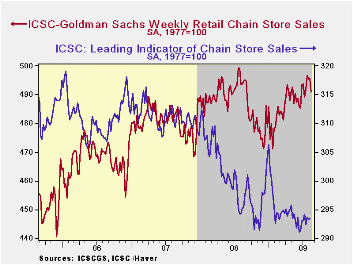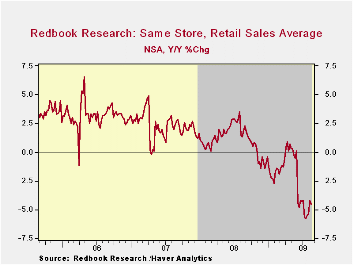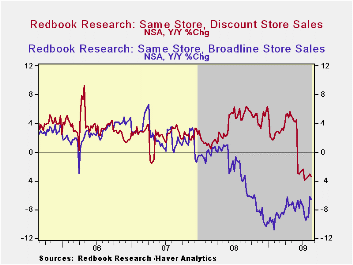 Global| Aug 19 2009
Global| Aug 19 2009Weekly Chain Store Sales Remain Flat Versus July
by:Tom Moeller
|in:Economy in Brief
Summary
Encouraging indications that consumer spending was improving faded during August. During the latest week, chain store sales fell 0.9% and that was enough to leave the August average unchanged from July after that month's 1.0% increase [...]
 Encouraging
indications that consumer spending was improving faded during August.
During the latest week, chain store sales fell 0.9% and that was enough
to leave the August average unchanged from July after that month's 1.0%
increase from June.
Encouraging
indications that consumer spending was improving faded during August.
During the latest week, chain store sales fell 0.9% and that was enough
to leave the August average unchanged from July after that month's 1.0%
increase from June.
During the last ten years there has been a 69%
correlation between the year-to-year growth in chain store sales and
the growth in general merchandise sales. The weekly figures
are available in Haver's SURVEYW database.
The ICSC-Goldman Sachs retail chain-store sales index is constructed using the same-store sales (stores open for one year) reported by 78 stores of seven retailers: Dayton Hudson, Federated, Kmart, May, J.C. Penney, Sears and Wal-Mart.
Prospects for improvement in sales seem limited. The leading indicator of sales ticked up 0.1% (-0.3% y/y) during the latest week and it has been flat all this year.
 The Johnson Redbook also reported soft sales of late. General
merchandise store sales so far this month slipped a seasonally adjusted
0.6% from July (-4.4% y/y). Department store sales were down 6.6% y/y
on a same-store basis while discount store sales fell a lesser 3.4% as
shoppers searched for bargains.
The Johnson Redbook also reported soft sales of late. General
merchandise store sales so far this month slipped a seasonally adjusted
0.6% from July (-4.4% y/y). Department store sales were down 6.6% y/y
on a same-store basis while discount store sales fell a lesser 3.4% as
shoppers searched for bargains.
Excluding Items from Personal Consumption Expenditures Inflation from the Federal Reserve Bank of Dallas is available here.
| ICSC-UBS (SA, 1977=100) | 08/14/09 | 08/07/09 | Y/Y | 2008 | 2007 | 2006 |
|---|---|---|---|---|---|---|
| Total Weekly Chain Store Sales | 491.0 | 495.6 | -0.6% | 1.4% | 2.8% | 3.3% |
Tom Moeller
AuthorMore in Author Profile »Prior to joining Haver Analytics in 2000, Mr. Moeller worked as the Economist at Chancellor Capital Management from 1985 to 1999. There, he developed comprehensive economic forecasts and interpreted economic data for equity and fixed income portfolio managers. Also at Chancellor, Mr. Moeller worked as an equity analyst and was responsible for researching and rating companies in the economically sensitive automobile and housing industries for investment in Chancellor’s equity portfolio. Prior to joining Chancellor, Mr. Moeller was an Economist at Citibank from 1979 to 1984. He also analyzed pricing behavior in the metals industry for the Council on Wage and Price Stability in Washington, D.C. In 1999, Mr. Moeller received the award for most accurate forecast from the Forecasters' Club of New York. From 1990 to 1992 he was President of the New York Association for Business Economists. Mr. Moeller earned an M.B.A. in Finance from Fordham University, where he graduated in 1987. He holds a Bachelor of Arts in Economics from George Washington University.
More Economy in Brief
 Global| Feb 05 2026
Global| Feb 05 2026Charts of the Week: Balanced Policy, Resilient Data and AI Narratives
by:Andrew Cates






